Fallen Kingdom isn't any smarter than Jurassic World, but it's better-crafted fun

During a break from the awe, suspense, and action of Jurassic Park, Steven Spielberg’s camera pans across shelves of theme park merchandise with a combination of sardonic amusement and score-twinkling love. (This was Spielberg, after all.) Though the shot was much-mentioned 25 years ago when the movie was first released, it’s nonetheless striking today how loaded that moment feels now that Jurassic Park is an ongoing series, not a one-off event. Whether always intentionally or not, that series is now about both the foolishness and undeniable allure of spending untold millions (“spare no expense!”) to not leave well enough alone.
This description still applies to the mish-mashiest entry yet, Jurassic World: Fallen Kingdom (or, for the rebranding-averse, Jurassic Park 5). The sequel to in-continuity reboot (and international mega-smash) Jurassic World moves ever further away from the original film’s premise, which asked what might happen if scientists were able to bring back dinosaurs for fun and profit. Following the amusement park’s opening sometime after Jurassic Park III and its efficient destruction in Jurassic World, Fallen Kingdom has no real choice but to move further into sci-fi. A simple our-world-plus-a-few-dinosaurs scenario has mutated into a full-on alternate universe, where Congress debates whether to intervene in the re-extinction of the dinos when a volcano threatens former park site Isla Nubar. (The population of Isla Sorna, the free-range dinosaur island where the second and third movies take place, is hand-waved away.)
Dr. Ian Malcolm (Jeff Goldblum) makes a brief appearance arguing for extinction, but Claire Dearing (Bryce Dallas Howard), the former Jurassic World exec, has been converted to conservationist, just like John Hammond was for Lost World. When Hammond’s ex-partner Benjamin Lockwood (James Cromwell) and Lockwood’s financial manager Eli Mills (Rafe Spall) ask her to help them on a mission to relocate the beasts to another island sanctuary, she agrees and recruits a small team: her coworkers Franklin (Justice Smith) and Zia (Daniella Pineda), and her ex-boyfriend Owen Grady (Chris Pratt). Owen is not reintroduced sporting a bushy woodsman’s beard, but he is first seen building his own house in the middle of nowhere, so close enough.
Of course, every invitation ever extended to Isla Nublar has come freighted with some kind of ulterior motives, and this rescue mission is no exception. To explain more would probably constitute some manner of spoiler, but suffice to say that Owen is wanted on this mission for his rapport with Blue, the raptor he trained from birth, and little else. This actually makes sense; Owen Grady is not actually that enjoyable to be around, as these movies continue to inexplicably squander Pratt’s abilities as a comic actor. Spielberg is not often cited for his way with comedy, but he looks like a virtuoso next to the Jurassic World crew, who also assign Justice Smith a clear role as comic relief but fail to give him a single laugh line—or, for that matter, a line that truly qualifies as a proper joke.
Yet there is visual wit in Jurassic World: Fallen Kingdom, and some invention, too. The screenplay is credited to World director Colin Trevorrow and his writing partner Derek Connelly, but the director here is J.A. Bayona, who delivers more memorable images and, unlike Trevorrow, knows how to build suspense for longer than 30 or 60 seconds at a time. The opening of Fallen Kingdom, featuring an underwater craft, a helicopter, and a rainstorm, is statelier and better-composed than just about anything in the previous film—and, no worries, it still features people getting killed by dinosaurs. In this scene and elsewhere, Bayona makes canny use of shadows, silhouettes, and reflections, but his chops aren’t limited to dinosaur-hiding. One of the best sequences places the danger in plain sight, as Claire and Franklin plunge into the ocean while housed inside one of World’s gyroscope hamster-ball vehicles, the camera right there with them as they look for a way out. Bayona even manages a few destructive moments that turn briefly poignant, without the ladles of sentiment he employed for The Impossible and A Monster Calls.
Later in the film, he also has the opportunity to put together set pieces quite unlike the park/jungle scenes that dominate the rest of the series. This change-up comes courtesy of the fairly bonkers script, which will doubtless inspire a litany of YouTube videos ranting about logic and plot holes. Make no mistake: Fallen Kingdom is not less stupid than Jurassic World, and it does not especially recapture the glory of Spielberg’s first movie (or the setpiece craft of his underrated sequel). But the brave, ridiculous forging of its own weird path makes for its own kind of fun. These movies often literally retread the same ground as their predecessors, encountering layers of detritus from those other movies in the process. (The original Jurassic Park cars are briefly rediscovered here, just as they were last time around.) The thematic work of Fallen Kingdom is scribbly and half-finished, a series of dopey riffs on what came before about humans living with the consequences of their scientific meddling. But as a lava-spewing, raptor-training, teeth-gnashing, monster-in-the-basement creature feature, it has a certain freshness.